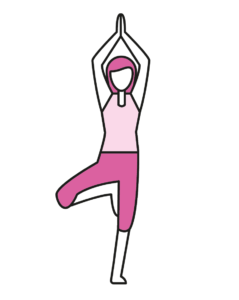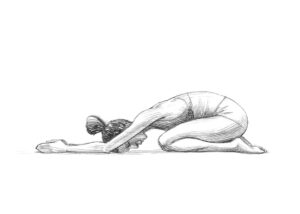Trauma-Informed Yoga
In many modern Western settings yoga is often misunderstood as being a physical practice focused on achieving complex postures and ‘pretzel like poses.’ This narrow view can create a sense of exclusion and inaccessibility – particularly for those who don’t identify as flexible, athletic, or physically capable. In reality, these misconceptions overlook the depth, adaptability, and therapeutic potential of yoga.
Yoga is a holistic integrative practice which is rooted in ancient philosophical traditions. The word “yoga” comes from the Sanskrit word yuj, meaning “to yoke” or “to unite.” At its core, yoga is a practice of integration of body, mind, and spirit as interconnected and inseparable aspects of the self.
Far beyond movement alone, yoga offers a supportive compassionate pathway back to the body and whole-person wellbeing. It encompasses many aspects including: ethical and mindful living (yamas and niyamas), breathwork (pranayama), meditation, mudras (hand gestures), self-inquiry, and compassionate presence. Yoga is about more than an on the mat practice (if using a mat to practice), it is a way of living and being that encourages connection, curiosity, compassion and care.

'Learn to Become Compassionately Present In Your Body Through Yoga'
What is Trauma-Informed Yoga?
Trauma-Informed Yoga acknowledges the profound impact that trauma can have on the whole person (body, mind and spirit). It is grounded in trauma-informed principles, respect, responsiveness and commitment to meeting people where they are, with the intention of supporting agency and autonomy, and regulation.
This approach prioritizes safety, empowerment, choice, and compassion. It creates a non-judgmental and inclusive environment where individuals are supported in reconnecting with their bodies at their own pace. Rather than being instructed, students are invited to explore movement in ways that feel right for them, with full permission to pause, modify, or opt out.
Instead of avoiding or overriding discomfort, Trauma-Informed Yoga offers tools to meet what arises with compassion, self-regulation, and a gentle curiosity. It respects and honours nervous system responses and encourages connection to a felt sense of safety.
Over time, this practice can help build nervous system capacity, enabling individuals to be present with a broader range of sensations, emotions, and thoughts, without becoming overwhelmed or reactive. It invites the cultivation of embodied presence in a way that feels safe, empowering, compassionate and attuned – supporting a deeper sense of agency and trust within oneself.
Ann’s Approach
Ann brings a compassionate, inclusive, and trauma-informed approach to yoga, rooted in the principles of choice, empowerment and collaboration – the same trauma-informed principles that guide all her work. Many people have shared that Ann has made yoga feel accessible to them for the first time, enabling them to experience its benefits in ways that feel safe and supportive.
Yoga is integrated into Ann’s somatic wellbeing offerings, as well as her physiotherapy practice (known as physio-yoga), particularly to support people living with chronic health conditions, such as:
- Persistent Pain
- Fibromyalgia
- Long Covid
- ME/CFS
- PoTS
- Functional Neurological Disorder (FND)
Nervous system dysregulation is usually part of these conditions. When practiced at the right level for the individual, yoga can gently support regulation, and promotes healing.
Yoga is also an important element of Ann’s online somatic wellbeing workshops and bespoke somatic wellbeing programmes, all of which are designed to be adaptable, accessible, empowering, compassionate, and trauma-informed. Ann sometimes incorporates yoga nidra, a deeply restful guided meditation, into both 1:1 sessions and group workshops.
Ann has trained in Hatha, Restorative & Trauma-Informed Yoga, and her approach may include elements of other styles of yoga from self-study, as well as adapted tai chi and pilates from her boarder movement training.
Hatha yoga
Is a broad and foundational style that typically involves gentler movement than more physically demanding styles such as Vinyasa and Ashtanga. It incorporates breathwork (pranayama) with movement, to support balance between body and mind. It may also use mudras (hand gestures), which can help to focus the mind and believed to have various physical and psychological effects. Depending on how it is taught, Hatha yoga is accessible to many people and levels of experience with yoga practice. It emphasises finding balance between effort and ease.
Restorative yoga
Is a very gentle and deeply restful style of yoga that uses props to fully support the body in comfortable postures of stillness. Movement between the yoga poses (asanas) is slow and intentional to help maintain a sense of calm and presence. Postures are typically held, fully supported by props, for anywhere between 5 and 20 minutes. This practice encourages deep relaxation, nervous system regulation, and a felt sense of safety. It can be especially supportive for those experiencing pain, fatigue, stress and anxiety.

What Are the Benefits?
Research consistently supports yoga’s role in improving both physical and mental health, contributing to an overall sense of healing, wholeness, and quality of life. When practiced with awareness, an understanding of nervous system regulation and compassion, yoga can:
- Reduced stress and anxiety
- Improved sleep quality
- Support the management of chronic conditions
- Enhance emotional regulation
- Improves physical abilities, including co-ordination, strength, balance
- Improved cognitive abilities, including focus and attention
- Increased somatic awareness & presence
Yoga invites us to broaden awareness and meet life with more openness, compassion and curiosity. Practiced within the framework of the eight limbs of yoga, it nurtures connection within ourselves, with others and the environment around us – cultivating a sense of compassion, common humanity and collective wellbeing. It can contribute to healing, an overall sense of wellbeing and quality of life.
Would You Like to Explore More?
If you’re curious about how trauma-informed yoga could support your wellbeing, you’re warmly invited to explore more on the Integrative Somatic Wellbeing. There you can learn more about how these approaches are integrated into Ann’s wider therapeutic work, in a way that is grounded, evidence-informed, trauma-informed and deeply compassionate. Ann’s integrative approach is tailored with professionalism, compassion and care to meet you exactly where you are
You’re also welcome to get in touch to book a free 15 minute discovery call – a space to explore whether this work feels like the right fit for you, there is no obligation to book an appointment after this call – email Ann info@unityphysio.co.uk, or call 07871240188, or send a contact form by clicking book now in the blue box below.
Other Related Services at Unity Physiotherapy & Wellbeing
Location
You can arrange a virtual appointment for anywhere in the UK or an in person appointment in North Hykeham, Lincoln.
Get in touch
If you would like to find out how Ann can help manage and change fatigue, do what you love, live well and thrive again get in touch to book your appointment, or a free 15 minute call to help you decide if working with Ann is right for you.
